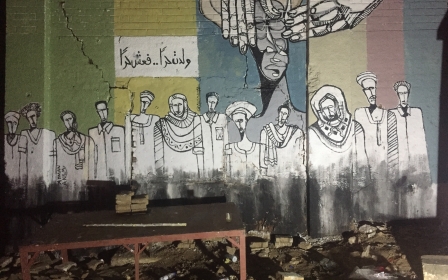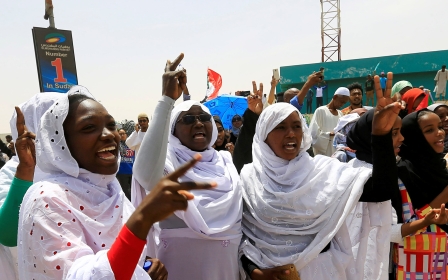Three members of Sudan's military council resign as opposition restarts negotiations

Three members of Sudan's ruling military council resigned, a statement from the body said, after it held a meeting with protest leaders.
The three members of the 10-strong council resigned on Wednesday as the council said it had reached "agreement on most demands" made by the protest leaders.
Sudan's opposition party Forces of the Declaration of Freedom and Change had begun negotiating with the ruling Military Transitional Council (MTC) late on Wednesday, after it had suspended talks on Sunday.
Both parties agreed to form a committee to resolve their disagreements, as tensions rise over how long it will take to move to civilian rule after the overthrow of leader Omar al-Bashir.
"We are partners working together to bring Sudan to safety," TMC spokesman Shams El Din Kabbashi said on state TV after a meeting with the opposition.
New MEE newsletter: Jerusalem Dispatch
Sign up to get the latest insights and analysis on Israel-Palestine, alongside Turkey Unpacked and other MEE newsletters
The TMC and the Forces of the Declaration of Freedom and Change have appeared on a collision course in recent days over popular demands for democratisation under civilian government. Earlier on Wednesday, the TMC invited the opposition to the meeting.
The opposition movement, which includes protest organisers Sudanese Professionals' Association (SPA), said it would come to talks with the TMC and "listen with an open mind".
"The Forces of the Declaration of Freedom and Change decided to respond to the invitation and listen with an open mind to what the president of the military council will propose, asserting that our desire is the peaceful transfer to a transitional civilian authority that reflects the forces of the revolution," SPA said in a statement.
The SPA had declared on Sunday it would suspend talks with the military council.
While the opposition has insisted on a swift handover of power to civilians, the TMC has said the process could take as long as two years. Bashir ruled for 30 years after taking power in a military coup in 1989.
On Tuesday, SPA and witnesses said security forces tried to break up a sit-in outside Khartoum's Defence Ministry. The group encouraged protesters to put up more barriers and continue their demonstration.
Middle East Eye delivers independent and unrivalled coverage and analysis of the Middle East, North Africa and beyond. To learn more about republishing this content and the associated fees, please fill out this form. More about MEE can be found here.





